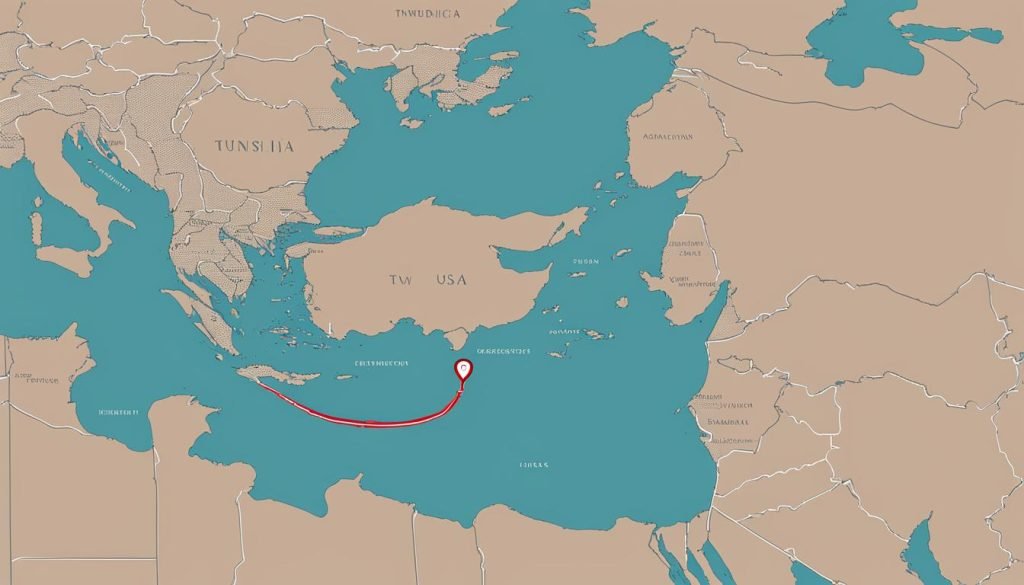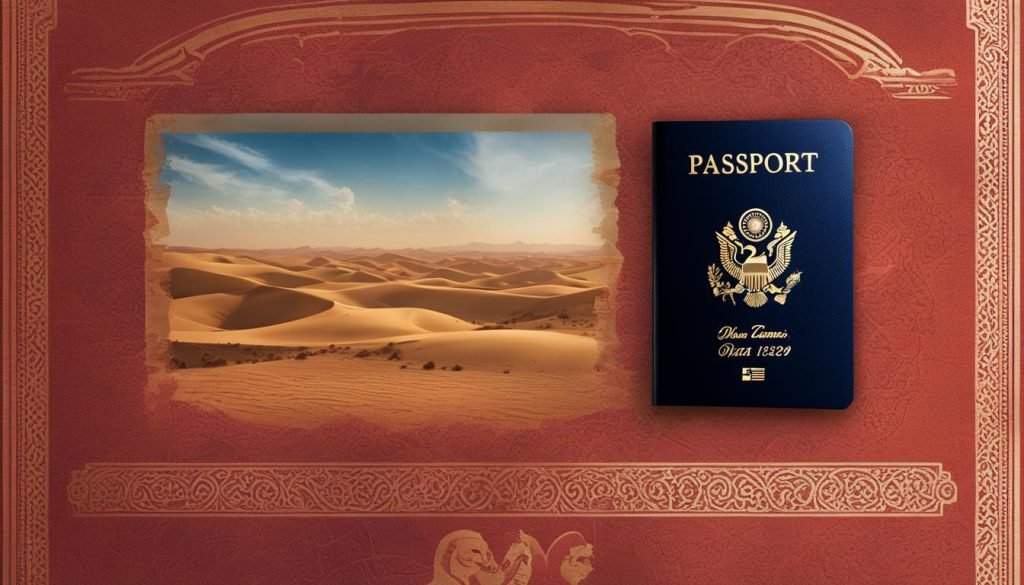As I ponder my travel plans, the question “Can I Travel To Tunisia From the USA?” inevitably comes to mind. Navigating the travel restrictions Tunisia has in place is key for a smooth journey. With current Tunisia travel guidelines advising heightened vigilance, it’s crucial for travelers like myself to stay informed on Tunisia border control measures and heed Tunisia travel advisories. It’s not just about safety but about being a responsible traveler, ready to adapt to ever-changing circumstances that may arise during my travels.
Key Takeaways
- Stay informed on the latest travel restrictions Tunisia has implemented.
- Review and adhere to Tunisia travel guidelines for a safe trip.
- Be aware of Tunisia border control measures when planning your itinerary.
- Pay close attention to Tunisia travel advisories for up-to-date information.
- Maintain a high level of vigilance to navigate any potential risks while abroad.
Understanding the Current Travel Restrictions to Tunisia
As I delve into the latest updates on entry regulations Tunisia has put forth, it’s clear that staying ahead of Tunisia travel requirements is essential for anyone planning to visit this North African gem. The U.S. Department of State consistently evaluates risks and adjusts travel advisories to keep travelers informed. Whether it’s a concern for security or health, understanding these guidelines not only assists in planning a safer trip but also helps in comprehending the socio-political landscape of the country.

At present, a travel ban Tunisia may impose can influence intended destinations within the country. It’s more than a cursory check; it’s a step towards ensuring safety amidst the vibrant culture and historical landscapes that Tunisia offers.
State Department Advisory Levels and What They Mean
The State Department’s advisory levels provide a quick reference to the current state of travel safety in various regions. Each level reflects a particular concern, from “Exercise Normal Precautions” to “Do Not Travel,” which can signify high-risk areas. The reason could be anything from civil unrest to health alerts, such as the recent Tunisia Covid-19 travel updates.
Specific Areas in Tunisia with Increased Risk
It’s imperative to heed advice on specific regions where the risk is notably heightened. Areas within 30 km of the Libyan border or mountainous regions like Chaambi Mountain National Park, a scenic yet precarious location, are to be approached with caution or avoided entirely. This is not just standard protocol; it’s a reflection of real and present risks that could jeopardize the safety of travelers.
Terrorism and Areas to Avoid for US Citizens
My research underscores that threats from extremist groups remain a serious concern, particularly for U.S. citizens. Areas such as the Algerian border and Jendouba, while rich in cultural heritage, pose significant dangers due to the potential for terrorist attacks. Understanding the underlying issues propelling these advisories is as crucial as recognizing the vibrant cultural tapestry that defines Tunisia.
Essential Tunisia Travel Requirements for US Citizens
Embarking on a trip to Tunisia, I make it a priority to understand the essential travel requirements, particularly as they pertain to a Tunisia visa for US citizens. It’s vital to stay apprised of the latest Tunisia travel advisories and recognize how Tunisia border control measures could impact my journey.
My checklist begins with the visa necessities. While preparing for the trip, I continuously consult the most current resources to ascertain the visa process specifics for U.S. citizens. I’m mindful of the increased vigilance advised in certain areas of Tunisia. Thus, I recognize the importance of obtaining comprehensive medical insurance that includes a plan for medical evacuation, foreseeing any needs that might arise in unexpected situations.
Travelers should remember that adherence to local laws and respect for customs is not just expected but required; it’s part of the international travel experience.
Staying connected through the Smart Traveler Enrollment Program (STEP) is a protective measure I wouldn’t overlook. It ensures that I receive crucial updates and alerts and facilitates ease of location in emergency situations. In this regard, I maintain updated contact information with the U.S. Embassy in Tunis, a key resource for assistance during my stay.
The table below encompasses essential information about travel requirements that could be of significance for fellow U.S. citizens planning a visit to Tunisia:
| Requirement | Description | Importance |
|---|---|---|
| Visa Status | Certain travelers might need a visa dependent on the length of stay | Critical for entry |
| Medical Insurance | Should ideally include medical evacuation coverage | Essential for health emergencies |
| Travel Advisories | Updated information on areas with heightened risks | Vital for itinerary planning |
| Border Control | Measures and updates for entry and exit from the country | Crucial for cross-border movement |
| Embassy Contact | Keep embassy contact information for emergencies | Important for crisis response |
| Enrollment in STEP | Enrollment ensures that travelers receive timely alerts | Useful for safety updates |
In line with being a responsible international traveler, I recognize that preparedness is paramount. As such, I will proceed with my Tunisia itinerary with care, ensuring that all travel requirements are fulfilled and I’m ready to enjoy the rich heritage and stunning landscapes of Tunisia safely.

Travel Ban Tunisia: Separating Facts from Myths
As a seasoned traveler, awareness and discernment are key in navigating the complexities of international travel; this is especially true when considering a destination like Tunisia. With a varying landscape of cultural richness and security concerns, it is essential to separate the facts from the myths about the current state of travel to this North African country. The real picture requires a nuanced understanding of the specific Tunisia travel requirements and existing travel restrictions Tunisia has for visitors, particularly for those of us from the United States.
The Reality of Terrorism Threats in Tunisia
Indeed, the threat of terrorism cannot be negated or overlooked. Facts are, several militant groups have been active in Tunisia, warranting concerns that primarily affect certain areas posing higher risks. The U.S. government has issued specific guidelines, such as travel alerts and advisories, indicating zones where vigilance is paramount. As U.S. citizens, we are urged to be cautious, particularly in proximity to the Libyan border and the mountainous areas to the west, both resonating with past activities by terrorist groups. A Tunisia visa for US citizens does not inherently come with danger, but it does come with a responsibility to stay informed.
Debunking Common Misconceptions About Travel to Tunisia
Amongst the chatter of uncertainty and caution are several misconceptions about travel to Tunisia. While there is merit to concerns based on facts, there is a greater geographical expanse of the country that remains welcoming and accessible to tourists. Not the entire nation live under a shadow of a travel ban. By understanding the detailed Tunisia travel requirements, I found that many regions continue to thrive and extend a warm invitation to international visitors, highlighting the importance of not painting all of Tunisia with the same brush of apprehension.
In preparing for my journey, research and staying up to date with the latest travel restrictions Tunisia may present is a part of my travel ritual. This due diligence equips me with a clearer view of Tunisia as a multifaceted country, ensuring my travel experience is as rich in culture and history as it is safe and informed.
Tunisia Covid-19 Travel Updates and Health Advisories
Staying informed about Tunisia Covid-19 travel updates is paramount in my preparation for visiting this beautiful country. Awareness of the fluidity of the situation and the potential for the imposition of a travel ban Tunisia may enforce, prompts me to regularly consult, not only the U.S. State Department’s website but the CDC as well, to ensure I have the latest travel health information for Tunisia at my fingertips.
Although the shadows of the pandemic are receding, it’s critical to stay vigilant regarding health guidelines. This includes adhering to recommended immunizations and practices. Vaccines such as those for Covid-19, hepatitis A and B, typhoid, and rabies, are among the protective steps advised by health authorities. Furthermore, when considering hydration options in Tunisia, opting for bottled water is a wise choice to avoid any potential health risks.
Along with best health practices, ensuring that comprehensive medical insurance is a part of my travel arrangements cannot be overstated. Medical insurance ideally should cover a wide range of scenarios, including medical evacuation, to guarantee peace of mind during my travels.
| Vaccine | Advisory | Precaution Level |
|---|---|---|
| Covid-19 | Recommended | High |
| Hepatitis A & B | Recommended for most travelers | Medium |
| Typhoid | Recommended for travelers to most regions | Medium |
| Rabies | Recommended for high-risk travelers | Low |
From taking necessary health precautions to being prepared for the nuances of Tunisia travel guidelines, my approach to traveling is holistic and informed. With continuous updates and advisories regarding health and safety, I am committed to traveling responsibly while exploring the richness Tunisia has to offer.
Conclusion
As I reflect on the comprehensive research surrounding Tunisia travel advisories, navigating through the nuances of Tunisia border control measures and entry regulations Tunisia has instated is instrumental for a seamlessly planned trip. My journey to Tunisia, rooted in current Tunisia travel guidelines, epitomizes the essence of informed and mindful exploration.
Summarizing Tunisia Travel Advisories
Throughout my preparations, I have meticulously examined the essential advisories, distilled crucial facts for my safety, and adjusted my itinerary accordingly. The relevance of staying abreast with the most recent guidelines cannot be understated, especially given the fluidity of geopolitical dynamics that underpin travel destinations such as Tunisia. These advisories serve as a compass, guiding me through the myriad of cultural encounters that await while highlighting regions that necessitate a heightened level of caution.
Final Thoughts on Travel Safety for Tunisia
In closing, my contemplation of Tunisia’s travel landscape stresses the importance of vigilance and an ongoing commitment to personal safety. Such clear-eyed awareness enhances not only the security of my sojourn but also enriches it, as I confidently immerse in Tunisia’s storied history and living culture. Heeding Tunisia’s travel advisories and guidelines ensures that my journey remains within the bounds of enjoyment and far from the perils of oversight.
Planning Future Travel to Tunisia: Key Takeaways
Indeed, the future of travel to Tunisia holds promise — a blend of adventure and learning that beckons with warm Mediterranean breezes and invites exploration. But as I plan future travels, I’ll continuously revisit the U.S. State Department’s advisories, keeping myself updated with any modifications. By doing so, I maintain not only my itinerary’s relevancy but also the peace of mind that comes from knowing I am as prepared as possible for the incredible journey that lies ahead.







